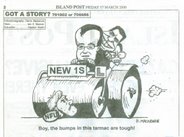Credit crisis
The biggest problem is the issue of 'moral hazard' - why should the banks be bailed out for making fundamental mistakes in the operation of their business? Will they not then think that they can do what they like, and always have that safety net there?
With that in mind, I think that the approach of the Chancellor to the Bradford & Bingley has been absolutely spot on. The shareholders have taken a bath; the deposits have been sold to the highest bidder, and the loan book nationalised at about market price - which happens to be a very low price at this time.
It is exactly what the Government should have done with Northern Rock, and it only serves to highlight their incompetence when first faced with the fallout from the excesses of modern banking practice.
Last night the US rejected the bail-out deal for American banks. This was a deal which George Bush staked his entire reputation (!) upon, about which he 'shroud waved' and predicted financial disaster, unemployment and recession if it was not passed immediately. Congress considered the views of George Bush, and rejected them: for the time being.
I never thought I would say these words, but I agree with the Republicans on the issues arising. The bail-out left the banks virtually unscathed, free to continue to operate, and with no restrictions on doing the same again. That is wrong.
In both the US and the UK, the shareholders have to lose. The Chief Executives of the banks have to go - and without fat pay-offs - in an orderly fashion. Consolidation must not leave the Boards unaffected whilst the front-line staff are purged. The banks must face restrictions on the type and extent of lending they can undertake. Bonuses have to be tied to long term results, and must be more modest.
I would like to see a much higher rate of tax on the highest earners - say 50% on earnings over £150,000 and 60% over £1m - so that the excesses are curbed, or at least the Treasury receive an appropriate share. I think dividend payments are going to have to fall, and the funds kept in the companies to pay for growth.
But more than that, the self proclaimed Masters of the Universe have been shown to have been nothing more than grossly overpaid snake-oil salesmen selling a dodgy product. The banking system must now fundamentally change and return to its roots of prudence, customer service and security.





3 comments:
The main problem is that the owners/shareholders have no control over management, and specifically the management control bonuses. So the management take on highly asymmetric "black swan" risks, leading to high bonus payments for years until it all goes belly up, at which point they walk away scot free.
I only read your blog because my name is Angus Nicholson too. Wonder if we're related somehow? My family is from Inveraray area and came to the states in the late 1700's. Well nice work on your blog. I'll have to check in more often.
I wonder if there will still be places on the boards for up and coming retired government ministers or will all the financial institutions be truly independently regulated?
Post a Comment